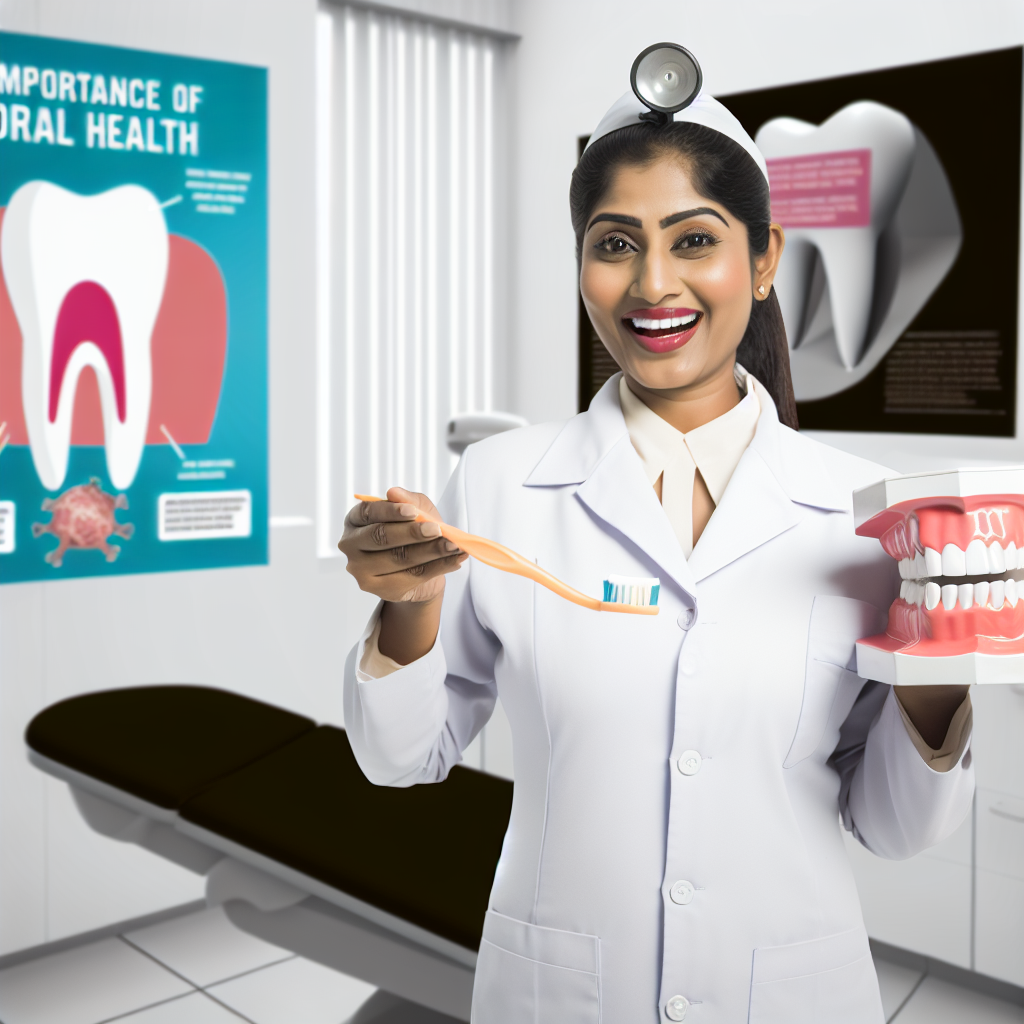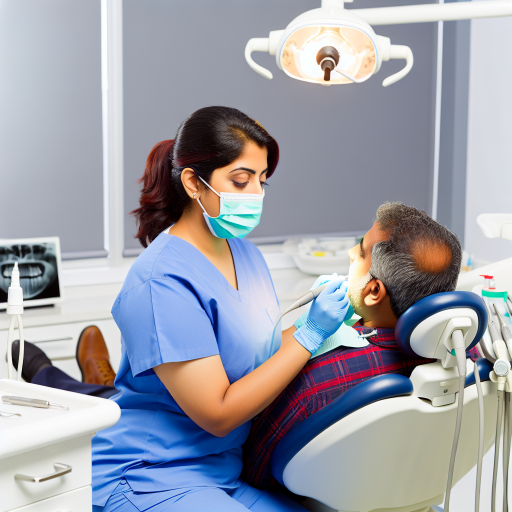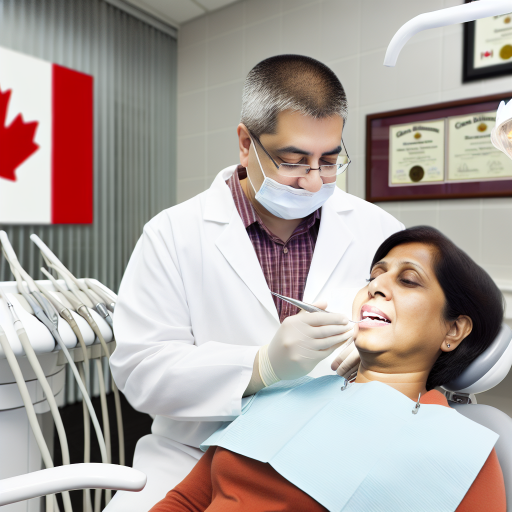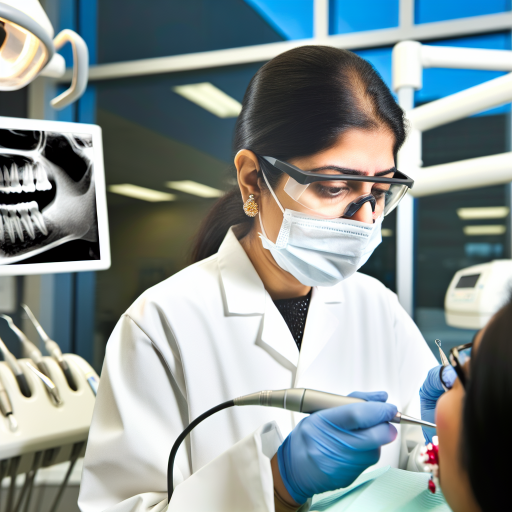The Role of Dentists in Promoting Oral Health
Introduction to Oral Health Promotion
Dentists play a crucial role in maintaining oral health in their communities.
They provide expert care and guidance on various oral issues.
Patients often rely on dentists for preventive strategies and treatments.
Moreover, dentists educate patients about the importance of oral hygiene.
Preventive Care and Treatments
Dentists perform regular check-ups to identify potential problems early.
They offer professional cleanings to remove plaque and tartar buildup.
This care helps prevent cavities and gum diseases.
Additionally, they provide treatments like fluoride applications and sealants.
Patient Education and Counseling
Educating patients about oral hygiene is a key focus of dental visits.
Dentists discuss proper brushing and flossing techniques with patients.
They also explain the impact of diet on oral health.
Furthermore, dentists counsel patients on avoiding harmful habits like smoking.
Community Engagement and Awareness
Dentists often participate in community outreach programs.
These programs aim to educate the public about oral health risks.
They may host free dental camps or workshops to increase awareness.
Such initiatives foster a culture of good oral health practices.
Collaborating with Other Health Professionals
Dentists frequently work alongside other healthcare professionals.
This collaboration ensures comprehensive patient care.
They may refer patients to specialists for advanced treatments.
Moreover, dentists contribute to multidisciplinary health initiatives.
The Significance of Regular Dental Check-Ups in Disease Prevention
Early Detection of Oral Diseases
Regular dental check-ups allow for the early detection of oral diseases.
These visits enable dentists to spot potential problems before they worsen.
For instance, cavities can be identified and treated early.
This proactive approach can prevent more extensive treatment later.
Prevention of Gum Disease
Routine visits help in the prevention of gum disease.
Unlock Your Career Potential
Visualize a clear path to success with our tailored Career Consulting service. Personalized insights in just 1-3 days.
Get StartedDuring check-ups, dentists can perform professional cleanings.
This process removes plaque and tartar that home brushing may leave behind.
Such cleaning significantly reduces the risk of gingivitis and periodontitis.
Education on Oral Hygiene Practices
Dentists also play a crucial role in educating patients.
They provide guidance on proper brushing and flossing techniques.
Additionally, they inform patients about dietary choices that impact oral health.
By receiving tailored advice, patients can improve their daily habits.
Screening for Systemic Health Issues
Dental check-ups can reveal signs of systemic health issues.
Conditions like diabetes and heart disease can manifest in the mouth.
Thus, dentists can refer patients for further medical evaluations.
This interdisciplinary approach highlights the connection between oral and overall health.
Establishing a Dental Home
Regular appointments create a dental home for patients.
This ongoing relationship fosters trust between patient and dentist.
As a result, patients feel more comfortable discussing concerns.
Furthermore, this familiarity can lead to better adherence to prescribed treatments.
Education and Awareness
Informing Patients
Dentists play a crucial role in informing patients about oral hygiene practices.
They provide guidance on effective brushing and flossing techniques.
Moreover, dentists emphasize the importance of regular dental check-ups.
During appointments, they discuss personalized oral care routines.
Creating Educational Materials
Dentists create educational materials to reinforce learning.
These materials often include brochures and pamphlets about oral health.
Additionally, many dentists utilize visual aids during consultations.
These tools help clarify complex dental procedures and concepts.
Community Outreach Programs
Participating in community outreach programs allows dentists to reach wider audiences.
They often organize workshops in schools to teach children about dental hygiene.
Furthermore, community events provide free dental screenings to promote awareness.
These initiatives help reduce dental issues in underserved populations.
Harnessing Digital Platforms
Many dentists leverage digital platforms to spread awareness.
They maintain informative websites that offer resources on oral health.
Social media channels allow dentists to share tips and updates regularly.
These platforms encourage patients to engage and ask questions about their concerns.
Delve into the Subject: Tips for Balancing Work and Life as a Dentist
Community Outreach Programs Led by Dentists to Promote Oral Health
Importance of Community Outreach
Community outreach plays a vital role in enhancing public oral health awareness.
It allows dentists to reach underserved populations efficiently.
These programs help in spreading information about preventive care.
Additionally, outreach fosters trust and rapport between dentists and communities.
Types of Outreach Programs
Dentists can conduct various types of outreach initiatives.
School-based programs educate children about proper dental hygiene.
Health fairs provide free dental screenings and consultations.
Community seminars focus on teaching families about oral disease prevention.
School-Based Programs
Programs in schools engage students and staff on dental health topics.
Demonstrations on brushing and flossing techniques are often included.
Furthermore, dentists can distribute oral hygiene kits to encourage proper habits.
Health Fairs and Community Events
Health fairs offer a platform for providing essential dental services.
Dentists can perform screenings for cavities and gum disease.
These events also allow for the distribution of educational materials.
Family Seminars
Family seminars create an inclusive environment for knowledge sharing.
They address common dental concerns such as tooth decay and cavities.
Interactive Q&A sessions allow attendees to ask their pressing questions.
Collaborations with Local Organizations
Collaborating with local organizations enhances the effectiveness of outreach.
Dentists can partner with schools, health departments, and non-profits.
These alliances expand the reach and impact of outreach programs.
Moreover, they provide additional resources for program support.
Results and Impact of Outreach Programs
Community outreach programs produce measurable increases in oral health awareness.
Participants often demonstrate improved dental hygiene practices.
Furthermore, outreach can lead to higher attendance at dental check-ups.
Ultimately, these programs contribute to a reduction in oral health disparities.
Uncover the Details: How to Stand Out as a Dentist in a Competitive Market
The Impact of Dental Treatments on Overall Health and Well-Being
Connection Between Oral Health and General Health
Dental health significantly influences overall well-being.
Research shows that oral infections can lead to systemic issues.
For example, gum disease has a proven link to heart disease.
Moreover, maintaining healthy teeth prevents complications.
This connection underscores the importance of regular dental visits.
Preventive Treatments and Their Benefits
Preventive dentistry focuses on avoiding dental issues before they arise.
Fluoride treatments protect against cavities effectively.
Sealants can shield vulnerable tooth surfaces, particularly in children.
These measures decrease the need for more invasive procedures later.
Consequently, they save time and resources for patients and dentists.
Restorative Dentistry Enhances Quality of Life
Restorative dentistry addresses existing dental problems.
Fillings, crowns, and bridges can restore function and aesthetics.
This restoration often improves self-esteem and confidence.
Furthermore, people who chew properly digest food better.
Thus, restorative treatments contribute to overall health and happiness.
Education and Awareness Initiatives
Dentists play a crucial role in educating patients about oral hygiene.
Good practices include brushing twice a day and flossing daily.
Moreover, dental professionals inform patients about nutritional choices.
For instance, limiting sugar intake can significantly reduce cavities.
Awareness campaigns promote regular dental check-ups and cleanings.
Addressing Systemic Health Issues
Dentists are often the first healthcare providers to identify issues.
They can recognize symptoms that indicate broader health concerns.
Such issues may include diabetes, osteoporosis, or even cancer.
By referring patients to appropriate specialists, dentists safeguard health.
Thus, their role extends beyond oral care alone.
Find Out More: What Does a Dentist Really Do? A Career Overview

Collaboration with Other Health Care Providers to Enhance Patient Care
Importance of Interdisciplinary Communication
Dentists play a crucial role in overall health care.
They often interact with physicians and specialists regularly.
This communication is essential for comprehensive patient care.
Sharing patient information helps in forming effective treatment plans.
Moreover, coordinated care can lead to better health outcomes.
Referral Systems in Dental Practice
Referral systems are vital in dental practice.
Dentists often refer patients to specialists for advanced care.
Such referrals ensure patients receive targeted treatment.
This process also aids in tracking patients’ progress.
Consequently, it enhances the overall patient experience.
Collaborative Health Education
Dentists participate in health education initiatives.
They collaborate with other health care professionals to educate patients.
This education covers prevention and treatment of oral diseases.
Workshops often include topics like proper hygiene and nutrition.
Patients benefit significantly from this collective knowledge.
Working with Community Health Organizations
Certain dentists partner with community health organizations.
These collaborations aid underserved populations effectively.
Community outreach programs provide dental screenings and education.
They promote oral health awareness in various communities.
This partnership fosters a healthier public overall.
Integrating Technology in Collaborative Care
Technology enhances collaboration among health care providers.
Electronic health records facilitate information sharing easily.
Telehealth options allow for real-time consultations.
This integration streamlines the patient care process.
Ultimately, it leads to more coordinated and efficient health services.
Explore Further: How to Become a Successful Dentist in Canada
Innovations in Dental Technology that Aid in Oral Health Promotion
Digital Impressions
Digital impressions improve the accuracy of dental fittings.
Dentists use intraoral scanners to create three-dimensional models.
This technology enhances patient comfort by eliminating messy materials.
As a result, it reduces the time needed for dental procedures.
Tele-dentistry
Tele-dentistry allows patients to consult with dentists remotely.
This service proves beneficial for those in rural areas.
It increases accessibility and promotes regular dental check-ups.
Moreover, it provides cost-effective solutions for many patients.
3D Printing
3D printing is revolutionizing the fabrication of dental appliances.
It allows for the quick production of crowns and bridges.
This innovation enhances customization for individual patients.
Consequently, it improves the fit and comfort of dental devices.
Laser Dentistry
Lasers in dentistry offer numerous benefits for patients.
They cause less pain and reduce the need for anesthesia.
Furthermore, laser procedures often result in quicker healing times.
This technology also minimizes the risk of infection.
Mobile Dental Clinics
Mobile dental clinics enhance oral health outreach efforts.
They travel to underserved communities and provide essential care.
With these clinics, dental teams can perform preventive services.
Patients receive education on maintaining oral hygiene.
Artificial Intelligence
Artificial intelligence assists dentists in diagnosing conditions.
AI analyzes dental images to identify potential issues quickly.
It streamlines treatment planning, making processes more efficient.
As a result, dentists can offer personalized treatment options.
The Role of Pediatric Dentists in Establishing Good Habits from a Young Age
Early Dental Visits
Pediatric dentists recommend early dental visits for young children.
This practice helps parents understand the importance of oral health.
Furthermore, it allows dentists to monitor dental development.
Cavity Prevention Education
Preventive education forms a vital part of pediatric dentistry.
Dentists teach parents about appropriate oral hygiene practices.
They provide guidance on fluoride use and dietary choices.
Moreover, they stress the significance of regular dental check-ups.
Building Positive Relationships
Pediatric dentists create a welcoming environment for children.
They use friendly communication to alleviate children’s fears.
This fosters a positive attitude toward dental visits.
Ultimately, it encourages lifelong oral health habits.
Developing Healthy Habits
Dentists emphasize the importance of brushing and flossing.
They often demonstrate proper techniques to both children and parents.
Regular check-ups allow for ongoing education on oral care.
Additionally, they encourage parents to model good habits.
Addressing Specific Dental Issues
Pediatric dentists cater to unique dental issues in children.
They assess and manage conditions like thumb sucking and teeth grinding.
This tailored approach supports individual oral health needs.
Consequently, it helps prevent long-term dental problems.
Additional Resources
From theoretical concepts to policies and applied programmes: the …
Early Childhood Caries in Indigenous Communities | Canadian …




